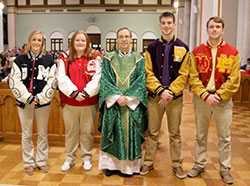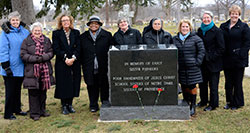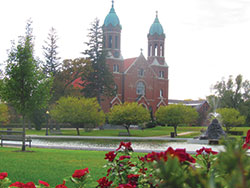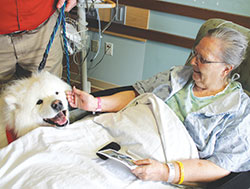Catholic News Around Indiana
Compiled by Brandon A. Evans
Diocese of Evansville
Bishop Urges Students To Put Their Faith In Action
 By Tim Lilley (Message Editor)
By Tim Lilley (Message Editor)
During the Feb. 1 Catholic Schools Week Mass at St. Benedict Cathedral in Evansville, Bishop Charles C. Thompson urged students from the Diocese of Evansville’s 26 Catholic schools to put their faith in action.
“We are called to grow as members of the community,” the bishop said in his homily. “Our schools prepare people to be involved in our community. We must put our faith in action. Those who accept Jesus and accept his teaching are his disciples. That is the core of what we celebrate in Catholic schools … to know Jesus and to know how to bring others to him by the witness of our lives.”
Bishop Thompson told the young people that he recognizes and appreciates all of their great academic and athletic achievements – and their Catholic identity.
“As Bishop, my goal when it comes to Catholic schools is to make sure that, in the midst of all the great things that you do, there is a strong Catholic identity,” he said. He asked students in attendance what they thought of when they heard the term Catholic identity. Responses included going to Mass, serving others and receiving the Sacraments.
“Who is the center of all that? Jesus Christ,” the bishop said. “How Christ-centered are we in our lives? I look for that answer on the playground and the sports field, in the gym and the cafeteria. Are we remaining Christ-centered even beyond the doors and walls of our schools? Are we being consistent in the ways of Christ and the ways of our faith?”
Bishop Thompson discussed the 2017 theme for Catholic Schools Week :”Catholic Schools, Communities of Faith, Knowledge and Service.”
It’s one thing to know about Jesus,” he told the students. “It’s another to have a relationship with him. That relationship translates into service.”
He also discussed the 2016-17 diocesan theme for Catholic schools – “Educate, inspire and proclaim.”
“Together, we proclaim our faith by our words and our deeds,” he said. “In today’s gospel (the reading for Feb. 1, which is Mark 6: 1-6), Jesus proclaims the word of God. The people kind of write him off. His own relatives had difficulty accepting Jesus because of the way they perceived he should be. They had difficulty accepting him as the Son of God because of who they thought he was.”
Photo caption: Bishop Charles C. Thompson visits with with seniors from the diocese of Evansville's four Catholic high schools before the Feb. 1 Catholic Schools Week Mass at St. Benedict Cathedral. The Message photos by Tim Lilley.
(For news from the Diocese of Evansville, log on to the website of The Message at www.themessageonline.org)
Diocese of Fort Wayne-South Bend
Poor Handmaids of Jesus Christ leadership visits
 The Leadership Team of the international congregation of Poor Handmaids of Jesus Christ recently visited northern Indiana from Dernbach, Germany. Their purpose was to come to know each sister better as well as experience the ministries in which PHJC sisters are engaged.
The Leadership Team of the international congregation of Poor Handmaids of Jesus Christ recently visited northern Indiana from Dernbach, Germany. Their purpose was to come to know each sister better as well as experience the ministries in which PHJC sisters are engaged.
Elected by their sisters in nine countries, the general leadership team includes Sister Gonzalo Vakasseril, General Superior, India; Sister Annemarie Kampwerth, U.S.; Sister Shirley Bell, U.S.; and Sister Barbara Spiegelhoff, Germany. The team began their 10-week visit in the United States at the end of November in Chicago, going to the order’s Motherhouse in Donaldson and then traveled to the various convents and ministry areas in four states.
Last week, the four sisters visited two of their ministries in Fort Wayne: The St. Joseph Community Health Foundation and HealthVisions Fort Wayne. They also paid a visit to the graves of 82 Poor Handmaid Sisters buried at Catholic Cemetery on Lake Ave. They also toured The Carriage House, a grantee of the St. Joseph Community Health Foundation, whose work embodies many of their values.
Sister Shirley Bell, councilor, said one highlight of the visit was for the team to see how the sisters and their co-workers partner together in ministry convinced of the vision of their foundress, Blessed Catherine Kasper. “Our core values of openness to the Spirit, dignity of the person, simplicity and community are easily seen in the sisters’ and co-workers’ enthusiasm and dedication.”
While the general leadership was here in the U.S., the American Poor Handmaids held their chapter meeting to discuss and make decisions for the future. A few of the areas of focus were spiritual life and community living, vocation and lay volunteer involvement, long-term sustainability of the environment and their ministries, and ongoing social justice and advocacy for the poor and vulnerable. The general leadership thought those concerns were important for the future of the PHJC community not only in the U.S. but throughout the nine countries — Germany, Netherlands, England, the U.S., India, Mexico, Brazil, Kenya and Nigeria — where they serve as an international congregation.
The Poor Handmaids of Jesus Christ first came from Germany to the U.S. in 1868, to the Hessen Castle area of Fort Wayne, at the request of Bishop Luers. Through the years they have served the poor locally in many ways, including by operating the St. Vincent Villa Orphanage, caring for the sick at St. Joseph Medical Center and teaching in Catholic Schools.
In 1998, St. Joseph Medical Center was sold. The sisters continue to provide aid to the poor and underserved in the greater Fort Wayne area through the St. Joseph Community Health Foundation and HealthVisions Fort Wayne.
Photo caption: Pictured, from left, are Sister Anne Marie Kampwerth, general vicaress; Sister Margaret Ann Hens, HealthVisions Midwest; Laura Dwire, program coordinator, St. Joseph Community Health Foundation; Renetta Williams, HealthVisions, Fort Wayne; Sister Barbara Spiegelhoff, general councilor; Sister Gonzalo Vakasseril, general superior; Meg Distler, executive director of the St. Joseph Community Health Foundation; Sister Shirley Bell, PHJC general councilor; and Marla Rust, grants coordinator, St. Joseph Community Health Foundation.
(For news from the Diocese of Fort Wayne-South Bend, log on to the website of Today’s Catholic at www.todayscatholicnews.org)
Diocese of Gary
No news briefs are available this week
(For news from the Diocese of Gary, log on to the website of the Northwest Indiana Catholic at www.nwicatholic.com)
Diocese of Lafayette
Saint Joseph’s College to temporarily suspend campus operations
 By Caroline B. Mooney
By Caroline B. Mooney
RENSSELAER — On Feb. 3, the Saint Joseph’s College Board of Trustees announced that after months of exploring options to overcome significant financial challenges, all activities located on its Rensselaer campus will be suspended at the end of the 2017 spring semester.
This will be effective following graduation in May and continue through the 2017-18 academic year.
The college will retain the bachelor of science degree in nursing program in Lafayette, and potentially other programs as long as they are delivered at locations other than the Rensselaer campus.
The college will begin a “Teach-Out” process with other institutions to ensure that students have options for completing their education.
“The temporary suspension of operations allows the possibility of something greater to come out of this decision, and to keep the mission of the college alive,” President Robert A. Pastoor said.
“Given the financial challenges that remain, we are heartened for our students, faculty, staff and alumni that the more than 125-year tradition of outstanding higher education will continue in some form for Saint Joseph’s College.”
Forums were held on Feb. 6 with faculty, staff and students to answer their questions. Through the spring semester, the college will continue to offer support meetings and counseling services to help process the changes.
Founded and sponsored by the Missionaries of the Precious Blood, Saint Joseph’s has an enrollment of nearly 900 students. The college is not financially linked to the Diocese of Lafayette.
In an email to the Saint Joseph College community and friends, Benedict Sponseller ‘74, Chairman of the Board of Trustees, said he is “greatly saddened that the mission of our founding fathers, the Society of the Precious Blood, who built the school and its charism, will not continue uninterrupted.
“… I hope and pray that we all can move forward with our lives knowing that, like so many other parts of this changing world, Saint Joseph’s College is being affected by the transitions around us,” he said. “Nevertheless, it gives me great solace and pride to know that thousands of Saint Joseph’s College graduates matriculated to careers that contribute to our society daily and in most every walk of life.”
Photo caption: Founded and sponsored by the Missionaries of the Precious Blood, Saint Joseph’s College in Rensselaer has an enrollment of approximately 900 students.
Therapy dogs bring joy, comfort to hospital patients, families and staff
 By Jesica E. Hollinger
By Jesica E. Hollinger
LAFAYETTE — “Oh my, oh my,” Yvonne Casto said, with an ear-to-ear grin stretching across her face, as she stroked Bessie’s silky fur and Bessie’s chin nuzzled the bedside.
A patient at Franciscan Health Lafayette, Casto petted the Flowered Chinese Sharpei as she talked with Tom Roberts, Bessie’s handler, during his round of hospital visits.
Roberts is a volunteer with the nationally certified Therapy Dogs International (TDI).
“She reminds me of our Brutus. We had him for 16 years; he died last March,” Casto shared with Roberts.
Exit Bessie, enter a second therapy pet visitor: Teddy, a white Samoyed accompanied by his handler, Bob Feuer.
“My husband took it hard,” Casto said of the loss of their dog. “He still says good night to Brutus before he goes to bed each night ... but we are too old, now, to get another dog. This is so nice, so nice.”
What kind of a dog is the best fit for the therapy program?
A therapy dog is born, not made, said Feuer, explaining that Teddy was a “discovered” rescue, living in a situation that didn’t work for Teddy or his former owners. When the two met, they instantly clicked.
“You can teach a behavior to a dog, but you can’t change a dog’s inherent temperament,” Feuer said. “Therapy dogs must be tolerant of other dogs, outgoing and friendly to all people – that was Teddy. I knew he was special from the beginning.”
Therapy Dogs International was founded in 1976 in New Jersey, when a group of dog handlers were competing at the AKC obedience trials. Their initial effort was to take the dogs to nursing homes for visits.
Therapy dogs differ from service dogs, in that a service dog is trained to help one person with a disability and helps only that person. Therapy dogs provide comport to all people.
In 2015, Franciscan Health Lafayette partnered with TDI and hosted a “Yappy Hour” to engage the community and educate area residents about the benefits from pet therapy dogs.
“Franciscan Health recognizes the value of utilizing trained therapy dogs in facilitating the well-being of patients, families and staff,” said Dr. Cecilia May, medical director of Franciscan Health’s palliative care program.
“I’ll be honest … I never was a dog-lover … it wasn’t until I met these guys (Bob and Tom) and saw these dogs in action,” May said. “I just never knew there could be such wonderful dogs.”
Photo caption: Teddy, a certified therapy dog, visits with Yvonne Casto during a recent trip to Franciscan Health Lafayette. The hospital currently has 10 certified therapy dogs and their handlers participating in its program on two campuses. (Photo by Jesica E. Hollinger)
(For news from the Diocese of Lafayette, log on to the website of The Catholic Moment at www.thecatholicmoment.org)
 By Tim Lilley (Message Editor)
By Tim Lilley (Message Editor) The Leadership Team of the international congregation of Poor Handmaids of Jesus Christ recently visited northern Indiana from Dernbach, Germany. Their purpose was to come to know each sister better as well as experience the ministries in which PHJC sisters are engaged.
The Leadership Team of the international congregation of Poor Handmaids of Jesus Christ recently visited northern Indiana from Dernbach, Germany. Their purpose was to come to know each sister better as well as experience the ministries in which PHJC sisters are engaged. By Caroline B. Mooney
By Caroline B. Mooney By Jesica E. Hollinger
By Jesica E. Hollinger